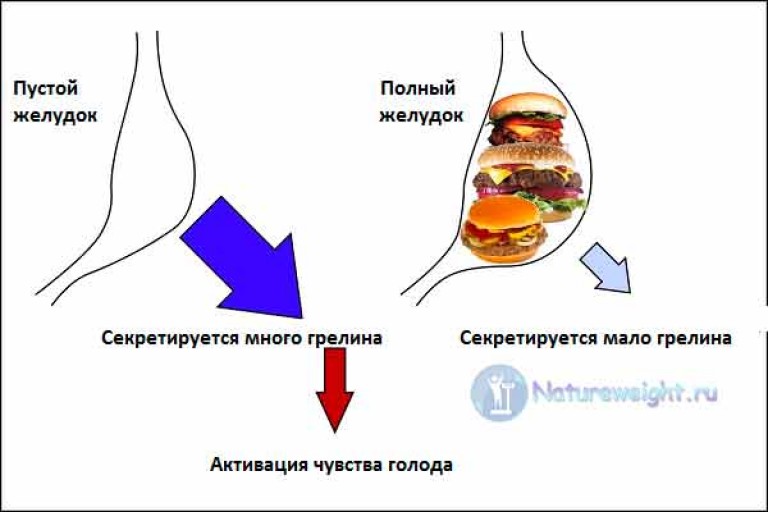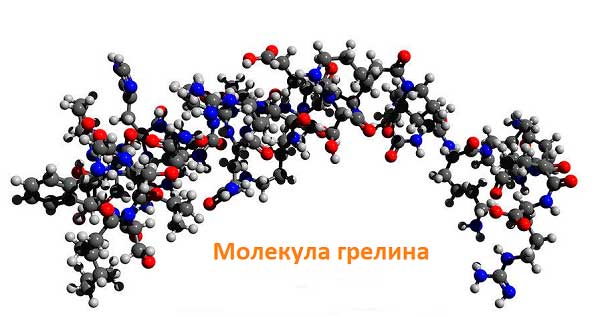Losing weight can be a difficult task. And saving its results is even more difficult. Especially if you want to eat all the time. As is usually the case after a diet.
According to medical statistics, the majority of those who have lost weight return all the kilograms they have lost, and often more than during the first year after normalizing their weight.
In many ways, this unfortunate development of events is due to the constant desire to eat, which is experienced by those who have lost weight. And the hunger hormone, ghrelin, is to blame for this feeling.
What it is?
Ghrelin is a hormone produced in the stomach in response to emptying. From the stomach, the compound enters the bloodstream and reaches the brain, where it acts on the hypothalamus.
The main function is to stimulate appetite. The hormone makes a person eat more by consuming a lot of calories and converting them into body fat.

In addition to the function of stimulating appetite, the substance has other tasks. It is involved in the regulation of the circadian sleep-wake cycle, carbohydrate metabolism, the sense of taste, and reward-seeking behavior.
The higher the ghrelin level, the stronger the appetite.
For a modern person, this connection may seem like some kind of monster. But from an evolutionary point of view, it is beneficial, as it contributes to the survival of the organism in the wild, helping it maintain a normal level of body fat for a rainy day.
These days, ghrelin can also be helpful for and/or suffer from anorexia.
What increases emissions and why is it so difficult to stick to a diet?
Normally, the level of the hormone rises when the stomach is empty and decreases when it is full.
But not everything is so simple.
It is logical to assume that people who are significantly overweight have an excess of ghrelin. But this is not entirely true either.
It has been found that obese people often have lower levels of the hormone than thin survey participants.
The problem is not related to the level of the hormone itself, but to the increased sensitivity of the GHS-R receptors to it.
The most unpleasant thing for those who want to lose weight is that the amount of ghrelin emitted, the sensitivity of its receptors and the conversion of calories consumed into fat do not depend on a person’s body weight. And even when the body is clearly obese, the work of the hunger hormone does not slow down.
Therefore, when you go on a diet, the following happens:
- you eat less, and an empty stomach releases more ghrelin into the bloodstream, which pushes you to start consuming more calories again and storing them as fat;
- the level decreases, and you again want to eat even more;
- the metabolic rate decreases.
All these events are links in the normal adaptation of the human body to hunger. They are necessary for the individual to survive in the wild. But they complicate the task of losing excess weight in these days, when overeating takes place. And there is no question of any genuine starvation.
Levels of the hunger hormone ghrelin begin to increase as early as the first day of the diet. And the increase continues over the next weeks and even months. This significantly reduces.
According to various estimates, the level of connection in people following a diet with severe calorie restriction increases by 24-43%. Moreover, the longer a person is on a diet, the more the release of ghrelin increases. As a result, maintaining the results of the diet becomes problematic.
How to lower the level and not suffer from hunger?
The level of the hunger hormone cannot be lowered by any dietary supplements or diet pills. However, there are several dietary methods that help keep it under control.

- Refusal of sweets. Including from foods rich in fructose. All sweet foods increase the release of ghrelin when emptying the stomach.
- Getting enough calories into your diet. In experiments, it has been shown that a periodic increase in calorie intake by 29-45% makes it possible to reduce the level of the hunger hormone by 18%. But these calories should come from the right sources - protein foods and healthy fats (butter, nuts, cheeses, etc.), and in no case from carbohydrates.
- More Protein. It has been established that less hunger hormone is released after a protein meal than after a carbohydrate meal. At the same time, protein food stays longer in the stomach, and the time interval between eating and the release of its emptying signal increases. Proteins contribute to the growth of muscle mass. And the more muscle and less fat in the body, the lower the level of ghrelin, and the less the body's sensitivity to it.
